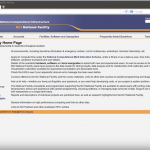 May 18, 2018 3:38 am
Published by Climate Extremes
May 18, 2018 3:38 am
Published by Climate Extremes
CLEX researchers writing in Nature Climate Change suggest a paradigm shift in how climate scientists approach climate change impact assessments. They suggest examining the system or potential catastrophe first instead of making the starting point a climate scenario.
 April 30, 2018 1:59 am
Published by Climate Extremes
April 30, 2018 1:59 am
Published by Climate Extremes
Centre of Excellence researchers have identified 12 marine heatwave types off the east coast of Tasmania, a location recognised as a global warming hotspot. Here the average sea surface temperatures here have been rising at four times the global average and trends in marine heatwaves are showing significant increases in number.
 April 26, 2018 11:41 pm
Published by Climate Extremes
April 26, 2018 11:41 pm
Published by Climate Extremes
World-first modelling research– which used several million CPU hours in Australia’s fastest supercomputer, Raijin, and ran calculations non-stop for over a year – has revealed the Southern Ocean mixes water between the depths and surface far more easily than previously thought.
 April 9, 2018 6:30 am
Published by Climate Extremes
April 9, 2018 6:30 am
Published by Climate Extremes
An international study in Nature Communications co-authored by researchers from the ARC Centre of Excellence for Climate Extremes (CLEX) and the Institute of Marine and Antarctic Studies (IMAS) reveals globally marine heatwaves have increased over the past century in number, length and intensity as a direct result of warming oceans.
 April 8, 2018 7:01 am
Published by Climate Extremes
April 8, 2018 7:01 am
Published by Climate Extremes
Time lapse video showing the construction of NCI's newest supercomputer, Raijin.
 April 8, 2018 6:53 am
Published by Climate Extremes
April 8, 2018 6:53 am
Published by Climate Extremes
How to start working on the NCI Supercomputer. This video by Scott Wales includes the basics of the queue and resource quotas.
 March 30, 2018 6:05 am
Published by Climate Extremes
March 30, 2018 6:05 am
Published by Climate Extremes
At this early stage in the research program, we have already seen significant progress on understanding how well temperature extremes can be simulated with CABLE coupled to the ACCESS system. Coupling has been improved and we have identified possible causes for the tendency for the model temperature to overstate extremes. This model focus will continue to be a priority in the early part of 2018.
The team has also identified specific continental heatwaves for initial investigation.
 December 23, 2017 10:50 am
Published by admin
December 23, 2017 10:50 am
Published by admin
CLEX Chief Investigator Prof Christian Jakob at a recent Monash University STEM talk takes his audience into the world of climate models. It’s a talk that looks under the hood to see what powers modern climate models.








